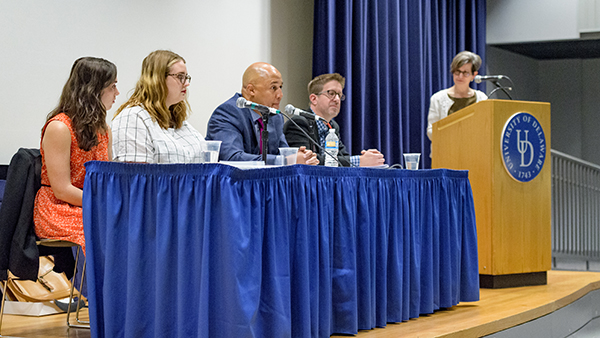


Taking action
Photo by Kathy F. Atkinson April 21, 2017
Panelists discuss activism, political change
Panelists at a recent University of Delaware forum, “Taking Action in the Trump Era: Community, State and Beyond,” discussed ways in which activists can work for political change and social justice.
The April 18 event was the third in a series of forums titled “What Happens Now?” that began shortly after the unusually divisive 2016 presidential election.
Patricia Sloane-White, associate professor of anthropology and organizer of the forums, told the audience in Trabant Theater that the series began as many students and others in the UD community were feeling alarmed about policies the new Trump administration might pursue. The second forum was then organized to focus on President Trump’s travel ban that had recently been announced and then challenged in court.
For the third, and final, forum of the semester, organizers decided to explore actions that individuals can take “to become agents of change,” Sloane-White said.
“We wanted to end the year on a more positive and powerful note,” she said.
Speakers on the panel discussed their own experiences and views about working and volunteering as advocates for causes in which they believed.
“To be an activist, it has to come from a place of passion and be rooted in your values,” said Savannah Fox, the Northeast Region advocacy coordinator for the relief organization CARE USA. She encouraged students to get involved in advocacy but cautioned that progress is rarely easy or quick.
“It can take years, if not decades” to see that your work has made a difference, Fox said.
Both she and panelist Sage Carson, a UD senior who has advocated for women’s issues and spoke as a representative of Planned Parenthood and the organization She Decides Delaware, talked about the need to work and build connections with local legislators and communities in order to make progress.
Charles Madden of New Castle County’s Office of Community Impact told the audience that his concern was less with Trump as an individual and more with what led so many voters to support him. Even in blue Delaware, Madden noted, four of 10 voters favored Trump.
Those kinds of divides are why people should talk to one another and try to understand opposing points of view, said Madden and Wayne Batchis, associate professor of political science and international relations at UD.
“I have students who voted for Trump and others who can’t understand how anyone could vote for Trump,” Batchis said.
He also described himself as fairly optimistic for the future, based on his expertise as a constitutional law scholar. He encouraged the audience to see the Constitution’s structure — with its checks and balances and an intentionally difficult process for amending it — as the reason political change is generally incremental and gradual. Unlike in many other countries, the Constitution and legal precedent in the U.S. strictly limit a chief executive’s actions, he said.
“Democracy can be very frustrating,” Batchis said, “…but there is evidence that our system is working.”
The forum was sponsored by the departments of Sociology and Criminal Justice, Political Science and International Relations, Women and Gender Studies, and History and by the College of Arts and Sciences.
Contact Us
Have a UDaily story idea?
Contact us at ocm@udel.edu
Members of the press
Contact us at 302-831-NEWS or visit the Media Relations website

